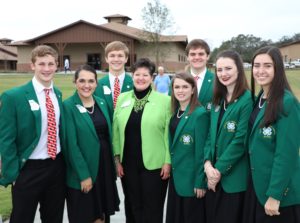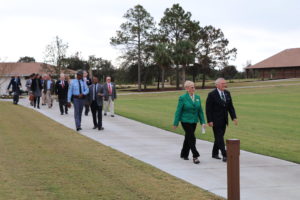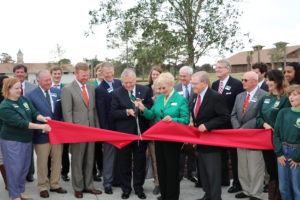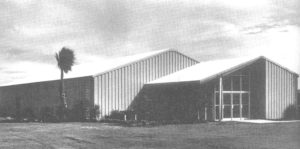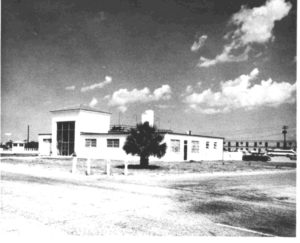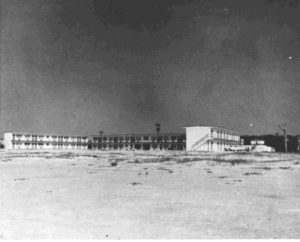On February 1st, 2017 Camp Jekyll reopened its doors to children in Georgia and beyond with a more than 15-acre campus that has been completely redesigned and rebuilt. Camp Jekyll features six large, modern sleeping cabins that can accommodate up to 256 guests at one time. The campus also includes a new dining hall, staff cabin, two outdoor pavilions with fire pits, a basketball court, volleyball court, a private beach crossover, and a beautiful, 300-seat auditorium that includes multi-use classrooms and breakout rooms. The creation of Camp Jekyll was the vision of Georgia’s Governor Nathan Deal, who allocated $17 million for the Camp’s development and construction. Sitting in the original footprint of the outdated Jekyll Island 4-H Center, Camp Jekyll continues the tradition of teaching Georgia’s children surrounded by the Island’s rich environment and diverse wildlife. Georgia 4-H continues to manage the day-ta-day operations, educational programming, and building maintenance while the Jekyll Island Authority is now reimbursed for providing landscaping services. Georgia 4-H is part of University of Georgia Cooperative Extension and has conducted summer camp programming at this location since 1983 and Environmental Education programming since 1987. The camp is available for rental to youth groups for camps and activities throughout the year. Extensive research and planning were invested in the development of Camp Jekyll to ensure the buildings would be kid-friendly, able to handle groups of varying sizes and ages, and would blend seamlessly into the surrounding natural landscape of Jekyll Island. Massive oak and mature palm trees from the former Jekyll Island Convention Center site were saved and transplanted within Camp Jekyll’s campus. While most of the campus is new construction, educational opportunities that highlight the unique history of the site are found across campus. The Historic Pavilion in the center of campus is from the Island’s first segregated beach. It was preserved and restored and now serves as a canteen, gift shop, and hub for activities. Interpretative exhibits documenting the site’s history from the late 1950s to 1964 are displayed throughout the campus.
Camp Jekyll Fact Sheet
• Rebuilt campus started construction on May 21, 2014
• Campus was dedicated on December 5, 2016 by Governor Deal
• Programming resumed February 2017
• Governor Deal allocated $17 million for the development and construction
• Campus is 15.89 acres
• Installed 119,345 cubic yards of fill (7459 truck loads) to raise elevation of the campus from 7.03 feet to 14 feet
• Constructed 12 new buildings
• Camp can sleep up to 256 guests at one time
• 11 oak trees were removed from original Convention Center site, stored, and have been planted at the front entrance • 8.4 acres of sod installed
• 1,163 pieces of furniture installed
• 1,080 feet of new/renovated dune crossover constructed
• 1 new volleyball court
• 1 new basketball court
• The buildings are named for native animals found on Jekyll Island
• The Historic Pavilion, home to the canteen and gift shop, was part of the Island’s first segregated beach
• Interpretative panels and displays are located throughout campus describing the site’s history from the late 1950s to 1964
• The auditorium named for the Governor’s wife, Sandra Deal, a longtime advocate for youth education and champion of the creation of Camp Jekyll
• JIA will reimbursed for providing landscaping services
• Georgia 4-H manages day-today camp operations including the Georgia 4-H Environmental Education Program, Georgia 4-H Summer Camping Program, and scheduling outside groups to use the campus
• Only youth programs and camps are permitted to use the campus
• Camp Jekyll is home to the Georgia 4-H Environmental Education (September thru May) and Summer Camp Program (June and first half of July) each year
• Georgia 4-H Summer Camp Program started on Jekyll in 1983
• Georgia 4-H Environmental Education (EE) Program started on Jekyll in 1987
Camp Jekyll Timeline
• March 1956: African-American business owners formed the St. Andrews Beach Corporation and built the Dolphin Club and Motor Hotel, a motel for the African-American visitors to the island.
• Late 1959: Hotel was sold to the Jekyll Island Authority that rented the 58 rooms at $8.50 per night. The Dolphin Club Lounge & Restaurant: Attracted prominent African-American entertainers including Clarence Carter, Tyrone Davis, Millie Jackson and Percy Sledge.
• June 1960: St. Andrews Auditorium built to maintain the separate but equal facilities for the island and was used for reunions, dances and concerts.
• June 1966: Dolphin Club and Motor Hotel closed and was used on/off for group camp and youth center.
• June 1983: Georgia 4-H leased facilities for use as 4-H Center Summer Camp.
• 1987: Program was expanded to include year-round environmental education program.
• March 29 2013; Jekyll Island Authority Chairman, Richard Royal, Executive Director, Jones Hooks and State 4-H Director, Arch Smith announced new partnership between the two organizations to improve, renovate and expand the center. Governor Nathan Deal recommended and the General Assembly approved, $12mm in funds in the FY 2014 budget for the purpose of this partnership. An additional $5mm was appropriated July 2014.
• May 2013: Demolition, construction and renovations begins with taking all buildings down except historic pavilion. Renovations include: new cabins, 2 new pavilions, renovation of historic pavilion, new dining hall, new staff housing and a new auditorium featuring offices, classrooms, animal labs and an infirmary.
• December 5, 2016: Opening ceremony for the new Camp Jekyll managed by Georgia 4-H, UGA Cooperative Extension.
• February 1, 2017: Operation of Camp Jekyll resumes with the return of Georgia 4-H Environmental Education school field studies




